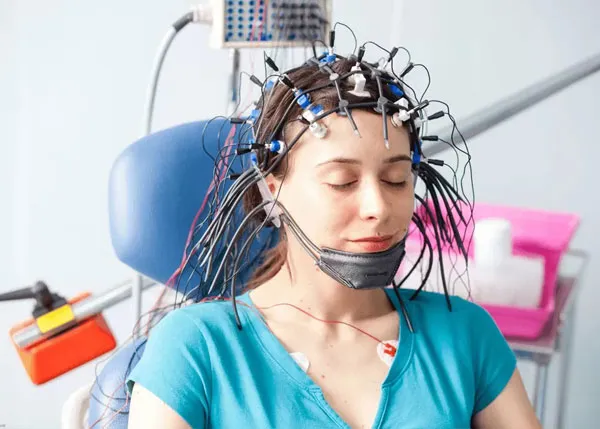An Electroencephalogram (EEG) is a safe, painless, and non-invasive test that records the brain’s electrical activity. It helps doctors study how the brain functions by detecting abnormalities in brain wave patterns. EEG is commonly used in diagnosing neurological conditions such as epilepsy, seizures, sleep disorders, and other brain-related problems.
Why EEG is Done
EEG may be recommended if you experience:
- Seizures or suspected epilepsy
- Frequent fainting spells or unexplained blackouts
- Sleep problems such as insomnia or narcolepsy
- Head injuries or trauma affecting brain function
- Confusion, memory loss, or cognitive decline
- Monitoring brain activity during surgery or intensive care
Preparation for EEG
- Wash your hair before the test (avoid using oil, gel, or spray).
- Continue taking your medicines unless your doctor advises otherwise.
- Avoid caffeine for at least 8 hours before the test.
- In some cases, you may be asked to stay awake the night before.
The EEG Procedure
- You will be asked to lie comfortably on a bed.
- Small, painless electrodes are attached to your scalp with a special gel.
- These electrodes record the brain’s electrical signals.
- You may be asked to breathe deeply, look at flashing lights, or even sleep during the test.
- The entire procedure usually takes 30–60 minutes.
EEG is completely safe and does not cause any discomfort.
Understanding EEG Results
- Normal EEG: Shows typical brain activity patterns.
- Abnormal EEG: May indicate epilepsy, seizure disorders, head injury, brain tumor, stroke, sleep disorders, or other neurological conditions.
- Results are interpreted by a neurologist and discussed with you for further treatment or investigations if required.
Meet Our Specialist Doctors


Why Choose Us for This Condition?
- State-of-the-art EEG machines with advanced technology
- Highly trained neurologists and technicians
- Comfortable, patient-friendly testing environment
- Fast and accurate reports
- Integration with overall neurological treatment plans
Located Conveniently for "EEG (Electroencephalogram) Near Me"
Nova Hospital is situated on Mawana Road, Rakshapuram, making it a central choice for patients in Meerut and nearby areas like Ganga Nagar and Modipuram.
Frequently Asked Questions
No, EEG is completely painless and non-invasive.
Most EEGs take 30–60 minutes. Special sleep EEGs may take longer.
No, EEG has no side effects and is completely safe.
